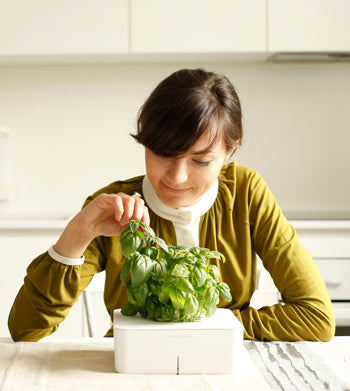News
A look at our edibles - Basil
Starting from today, every Tuesday we’ll create a blogpost with the uses and qualities of our edible Click & Grow plants. This week we’ll look at the amazing basil.

Background
Basil (Ocimum basilicum) is a culinary herb originating from India. In India, basil is considered a holy herb and is planted near the entrances of temples and even sacrificed to gods. Basil is prominently featured in Italian cuisine and also very popular in the Northeast Asia cuisine of Taiwan and the Southeast Asian cuisines of Indonesia and Thailand.
Culinary use
The fragrance and taste of Basil is modest and it doesn’t overshadow others. The leaves may taste somewhat like anise and are often with a sweet smell. Basil is commonly used fresh in cooked recipes. It is added at the last moment, for example directly to the plate or when removing the receptacle from the oven because cooking quickly destroys the flavor of basil.
Basil is suitable for a lot of nutriments including cheese, tomatoes and garlic. In addition basil can be bravely added to potatoes, fish, mushrooms, tossed salad, minced meat sauces and pastas. One of the best and probably most famous examples of basil’s taste and fragrance is pesto sauce.
All this talk about food made you hungry? Here’s a quick pesto sauce recipe:
Ingredients:
3 cups fresh basil leaves
1 1/2 cups chopped walnuts
4 cloves garlic, peeled
1/4 cup grated Parmesan cheese
1 cup olive oil
salt and pepper to taste
How:
In a food processor, blend together basil leaves, nuts, garlic, and cheese. Pour in oil slowly while still mixing. Stir in salt and pepper. Voila!
 |
Medicinal use Scientific studies have found that compounds in basil oil have potent antioxidant, antiviral and antimicrobial properties and potential for use in treating cancer. In India, basil is traditionally used for supplementary treatment of stress, asthma and diabetes. Basil also has anti-inflammatory properties. Eugenol, a volatile oil in basil, blocks enzymes in the body that cause swelling therefore making tha plant an ideal treatment for people with arthritis. Basil herb contains exceptionally high levels of vitamin A which is known to have antioxidant properties and is essential for vision. The mentioned vitamin is also required for maintaining healthy skin and consumption of natural foods rich in vitamin-A has been found to help protect the body from cancer. |
Basil is also a good source of magnesium, which promotes cardiovascular health. Magnesium prompts muscles and blood vessels to relax, thus improving blood flow and lessening the risk of irregular heart rhythms or a spasm of the heart muscle or a blood vessel.
All of that in one plant?! Basil is amazing!
Next week we’ll look at Thyme.
Cheers!